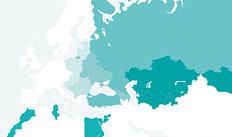COUNTRY ASSESSMENTS
Georgia
HIGHLIGHTS OF THE PAST YEAR
- The government established a public fund to support private sector investment. The Partnership Fund is endowed with equity stakes in the remaining major public enterprises and is intended to support commercially oriented private sector investment in priority areas.
- The authorities have worked to harmonise revenue needs with a balanced and fair tax system. The government introduced and later repealed legislation to prioritise tax payments with regard to secured lenders. The tax dispute resolution process was simplified and the tax ombudsman office was created.
- The prominence of the country’s dif ficult social issues increased during the parliamentary elections. In September 2012 minimum retirement pensions were increased and mandatory health insurance for retirees was introduced. Both the outgoing and the incoming governments identified agricultural development, health and education as priority areas.
KEY PRIORITIES FOR 2013
- Policies should support recovery of private investment. It will be important to ensure that the newly established Partnership Fund operates on a commercial basis and foments, rather than substitutes for, foreign direct investment.
- Complete restructuring and modernisation of the energy sector. Despite the significant transformation of recent years, liberalisation of the energy market and the country’s integration in regional energy markets remain incomplete and the sector still suffers from significant distribution losses and seasonal supply patterns inherent to Georgia’s hydrology.
- The government should continue to pursue policies to ensure that future development is more inclusive. Policies to support retraining of the labour force, integration of the agricultural sector in the market economy and development of the labour intensive sectors should help support employment creation and higher wages over time.
MACROECONOMIC PERFORMANCE
Macroeconomic performance has been strong. Output expanded by around 7 per cent in 2011 and 8 per cent in the first half of 2012. Growth has been broad-based with manufacturing, financial services and tourism among the main contributors. As international food prices moderated, inflation declined rapidly to -0.1 per cent in September 2012. The central bank was able to loosen monetary policy by decreasing the refinancing rate from the peak of 8 per cent in June 2011 to 5.75 per cent in June 2012. Although the current account deficit rose to 12.5 per cent of GDP in 2011, rising private inflows caused appreciation pressures and enabled the central bank to replenish external reserves. The share of non-performing loans in the financial sector has declined steadily, to 4 per cent of total loans (according to the IMF’s definition) at the end of July 2012. The general government deficit declined to 3.6 per cent of GDP in 2011. The authorities have been able to reduce reliance on official external financing, while maintaining a precautionary arrangement with the IMF.
The country’s successful stabilisation and recent performance have been recognised by the markets. Several international rating agencies upgraded their ratings of Georgia’s sovereign debt. The risk premium paid by the country narrowed to around 300 basis points as of September 2012. Georgian Railways, Georgian Oil and Gas Corporation (GOGC) and Bank of Georgia have been able to tap international markets. However, an international placement of the national railways’ shares, scheduled for May 2012, had to be postponed in light of the difficult financial markets environment.
The uncertain global environment warrants continued engagement with IFIs. The short-term macroeconomic outlook is positive as broad-based growth is expected to continue at a fast pace, benefiting from credit expansion, public and private investment and remittances. However, the current account deficit remains large (at 12.5 per cent of GDP in 2011) and the level of the financial sector’s dollarisation remains high although declining. The stock of external debt and overall external rollover needs are high for an emerging market economy. Replenished official international reserves and the precautionary Stand-By Arrangement with the IMF would ensure the country’s high current account deficit can be financed, should private sector flows reverse, and exchange rate movements can be smoothed to avoid destabilising the financial sector. The central bank mandated commercial banks to hold additional capital as a buffer for potential exchange rate movements.
MAJOR STRUCTURAL REFORM DEVELOPMENTS
The government established a fund to support private sector investment. The Partnership Fund (PF), endowed with equity in the country’s largest state enterprises (including Georgian Railways and GOGC), was established in June 2011 and commenced operations in the spring of 2012. It is intended to support commercially oriented projects in priority sectors in the form of minority equity stakes and debt financing. To ensure that the PF is transparently managed, it was set up as a joint stock company and will be subject to IFRS reporting and rating reviews by the international rating agencies. The fund’s operations will not benefit from explicit state guarantees. However, further measures will be needed to strengthen the fund’s governance and limit the associated fiscal risks.
Georgia’s excellent investment environment has been affected by forceful revenue collection measures. At an ease of doing business ranking of 16th (out of 183 countries), Georgia is the best-rated country in the transition region in the 2012 World Bank’s Doing Business Report. Large-scale privatisation is very advanced, tax and customs bodies are generally well run, and tangible results have been achieved in fighting corruption. However, over the past year, the tax administration has pursued aggressive tax collection measures, raising concerns about the magnitude and fairness of various penalties. The tax code was amended in January 2012 to allow for seniority of tax liabilities over secured lenders – potentially putting in question security of mortgages and other secured loans – a measure that was later reversed. At the same time, to improve efficiency of, and confidence in, the tax system the authorities have implemented electronic tax filing, improved customs clearance procedures, introduced advanced tax ruling option binding on the tax authority and created a tax ombudsman office.
The country’s social challenges were brought into sharp relief during the heavily contested parliamentary elections. Despite recent rapid growth, the rate of unemployment has remained high at around 15 per cent. Over half of the labour force is engaged in low productivity subsistence farming. About one-quarter of the population lives below the poverty line. The government has been piloting vocational training programmes, which has expanded employment opportunities for the participants. To integrate the agricultural sector into the market economy, the government is pursuing infrastructure development programmes and supporting projects to develop logistics and warehousing capacity although a fully-fledged strategy for agricultural development is yet to be articulated. The authorities continue to implement a national health care strategy for 2011-15 with the aim of improving the population’s health through a reduction of disease burden and mortality by 2015. However, the recently implemented vertical integration of insurance companies and the hospital sector may lead to conflicts of interest that could negatively affect the quality of health care.
The government’s plan to partially privatise several remaining public companies was shelved in the poor international market environment. The government has decided to delay the IPOs of minority stakes in several major state-owned companies due to difficult market conditions. The enterprises considered for market placement included stakes in the GOGC, Georgian Railways, and the capital electricity provider Telasi. Instead, in May 2012, GOGC successfully placed a five-year US$ 250 million Eurobond and, in June, Georgian Railways successfully placed a 10-year US$ 500 million Eurobond at the London Stock Exchange. The five-year issue, with a coupon priced at 7.125 per cent, was four times oversubscribed. The funds will be used for the construction of two hydropower plants in the Namakhvani Cascade of western Georgia. The issue should provide funds to support development of the export-oriented electricity sector and help strengthen GOGC’s corporate governance and transparency.
The National Bank of Georgia (NBG) has continued to pursue the policy of inflation targeting while strengthening its financial stability frameworks. The NBG has been transitioning to an inflation targeting regime, and has set an inflation target of 6 per cent for the medium term. An EBRD technical cooperation project is helping the central bank to make more informed policy decisions and strengthen its policy credibility by enhancing its forecasting and communication capacities. As inflation declined and the exchange rate appreciated, the central bank was able to reduce the policy rate. The authorities have continued implementing measures to comply with Basel II and Basel III regulations. Financial disclosure rules are being modified in order to comply with Basel II recommendations. The central bank also developed a framework defining the need for countercyclical buffers, in line with Basel III. In response to development of the retail sector, the central bank enacted consumer protection regulations and created a consumer protection unit expected to improve financial education and transparency of retail products.







